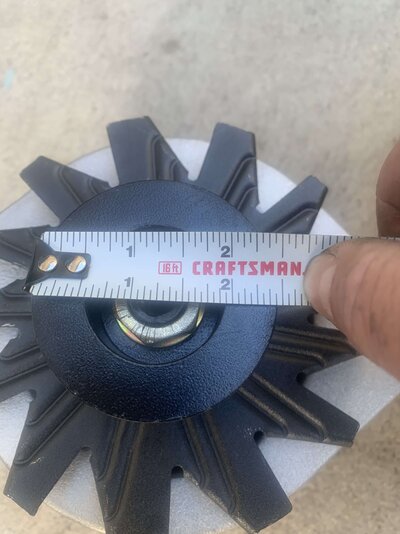Have you checked the battery cables? Might be time to replace and upgrade.
Alternator/charging issues
- Thread starter Street Sweeper22
- Start date
You are using an out of date browser. It may not display this or other websites correctly.
You should upgrade or use an alternative browser.
You should upgrade or use an alternative browser.
- Status
- Not open for further replies.
I'm going to step back to basics at this point.Battery tested good just low. So I charged the battery and the alternator tested good. Since doing that with the car running it still only puts out 13.1v max and sometimes drops down to 12v. That’s without the fans or the stereo running.
Volts, for lack of a better analogy, is measuring the potential for electricity to move, its the pressure, the force the electrons can move from point a to b. If it were a river it would be how steep the riverbed was, the potential for how quickly the water can go by. High voltage is like a waterfall. Low voltage is like a flat river.
Amps is how how much water is in the riverbed. Low amps is like a faucet. High amps is like a river.
So the ability for the electricity to move properly, that's your volts you're testing. Plenty of things influence it and can insert resistance that slows down the flow just like rocks in the river. Corroded connections. Bad wires. Defective components.
Different alternators are rated different amperage, even for the same make and model of car based on the installed equipment. They have different peak abilities for volume of flow they can generate.
Now, if you're using too much, drawing too much, it's like dipping into the river. Pull too much out of the system and you drain the battery down, just like the news out west where reservoirs are drying up from too much water pulled? The battery is like your reservoir. When there is extra capacity in your charging system, excess water flowing down river, it'll fill that reservoir (battery) up. And if your river doesn't have enough water going down it for your needs, you start drawing from the reservoir.
You can test different places along your charging system to find ones that have lower voltage than others and slow down the flow to charging your battery.
So, what you need to do it check out your grounds, start testing values, and test not just the alternator itself but your battery cable, start figuring out where the issue is.
13.1 is sort of low. Around 13.5-14.5 in normal with all the electrical goodies off in the car. Normally your alternator will charge around 1.5 volts higher than what the battery is, and yes, temperature can effect it slightly, not just load.
Double check the results you got. Digital Volt Ohm Meter/multimeter to positive and negative terminals on battery will give charge rate. Then, switch your meter to AC setting. Check the voltage reading again. This is a hack to check alternator diodes. If everything is working right, you get 0 ac voltage reading at your battery. If you DO get an AC voltage reading there, then one or more diodes on the alternator is leaking. Swap the alternator and try again.
Leaking, or shorted, diode can fluctuate the output voltage, and, let the battery's stored energy leak back through the alternator to the grounds when the car is sitting, running it down.
To jump to an obvious question, yes, it is possible where you can have a leaking diode in your alternator and still have it meet the electrical needs to keep the motor running, just maybe not the full load of equipment all on, but, have charging fluctuate and let the battery leak down when sitting.
Check the alternator mounting points for cleanliness, including the mounting bracket to engine contacts.
Last edited:
How much will pulley size affect the output of the alternator? The back pulley is 2 7/16 and the silver one is 2 9/16. I’m going to install new battery cables and put the alternator with the black pulley in and I will keep you posted. I wanted to put a new temp sensor in and fix some wiring that looks suspect while I’m there. I appreciate your guys help.
I’m not being a smart *ss when I say thank you for dumbing it down for me. The river analogy makes sense.I'm going to step back to basics at this point.
Volts, for lack of a better analogy, is measuring the potential for electricity to move, its the pressure, the force the electrons can move from point a to b. If it were a river it would be how steep the riverbed was, the potential for how quickly the water can go by. High voltage is like a waterfall. Low voltage is like a flat river.
Amps is how how much water is in the riverbed. Low amps is like a faucet. High amps is like a river.
So the ability for the electricity to move properly, that's your volts you're testing. Plenty of things influence it and can insert resistance that slows down the flow just like rocks in the river. Corroded connections. Bad wires. Defective components.
Different alternators are rated different amperage, even for the same make and model of car based on the installed equipment. They have different peak abilities for volume of flow they can generate.
Now, if you're using too much, drawing too much, it's like dipping into the river. Pull too much out of the system and you drain the battery down, just like the news out west where reservoirs are drying up from too much water pulled? The battery is like your reservoir. When there is extra capacity in your charging system, excess water flowing down river, it'll fill that reservoir (battery) up. And if your river doesn't have enough water going down it for your needs, you start drawing from the reservoir.
You can test different places along your charging system to find ones that have lower voltage than others and slow down the flow to charging your battery.
So, what you need to do it check out your grounds, start testing values, and test not just the alternator itself but your battery cable, start figuring out where the issue is.
13.1 is sort of low. Around 13.5-14.5 in normal with all the electrical goodies off in the car. Normally your alternator will charge around 1.5 volts higher than what the battery is, and yes, temperature can effect it slightly, not just load.
Double check the results you got. Digital Volt Ohm Meter/multimeter to positive and negative terminals on battery will give charge rate. Then, switch your meter to AC setting. Check the voltage reading again. This is a hack to check alternator diodes. If everything is working right, you get 0 ac voltage reading at your battery. If you DO get an AC voltage reading there, then one or more diodes on the alternator is leaking. Swap the alternator and try again.
Leaking, or shorted, diode can fluctuate the output voltage, and, let the battery's stored energy leak back through the alternator to the grounds when the car is sitting, running it down.
To jump to an obvious question, yes, it is possible where you can have a leaking diode in your alternator and still have it meet the electrical needs to keep the motor running, just maybe not the full load of equipment all on, but, have charging fluctuate and let the battery leak down when sitting.
I’m using a cheap multimeter from harbor freight. I have a fluke in storage in Arizona so I understand what you are saying.What are you using to measure the voltage? Even the very expensive autometer gauges don't measure the same as the Fluke meter.
I've always found if someone understands what they're measuring, and how it's supposed to be working, things will make more sense. We all learn somewhere, and for the longest time I HATED electrical troubleshooting off convoluted manuals. The dumbed down dealership charts really helped me out once I got ahold of them, just by drawing a stupid little box and naming it as a part of the car. Since then it's been a breeze. Still not fun, but, easy.I’m not being a smart *ss when I say thank you for dumbing it down for me. The river analogy makes sense.
I'm still not convinced you didn't have a leaky diode that the a/c test should show. Most testers and shops don't check that anymore, they only test load capacity.
Meanwhile, I'm going the next step further which I don't recall if I did or not. You mentioned having electric fans, and, a stereo system of some sort. If you multiply the volts by the amps, you get watts. So a 100a rater alternator is good for a 1350watt load if you figure 13.5a charging. People who step up to a 140a alternator are usually good for around 1890watt load. Some gbody cars, usually non-ac, had as little as a 60a alternator which is only good for running 810watts of equipment. And sometimes buying from pull a part or a shop calling a junkyard, they figure 84 is an 84, sure, I'll take the alternator. Amd the car gets downgraded to something smaller.
So IF you end up needing to replace it, think long term what you want to be running in the car and decide what strength makes sense for you. It's not a very expensive upgrade.
I order a 140 amp alternator from summit and it was physically to small by a half inch. After 4 different alternators all brand new the only one that fits is a delco/remit from autozone DL7134-6.I've always found if someone understands what they're measuring, and how it's supposed to be working, things will make more sense. We all learn somewhere, and for the longest time I HATED electrical troubleshooting off convoluted manuals. The dumbed down dealership charts really helped me out once I got ahold of them, just by drawing a stupid little box and naming it as a part of the car. Since then it's been a breeze. Still not fun, but, easy.
I'm still not convinced you didn't have a leaky diode that the a/c test should show. Most testers and shops don't check that anymore, they only test load capacity.
Meanwhile, I'm going the next step further which I don't recall if I did or not. You mentioned having electric fans, and, a stereo system of some sort. If you multiply the volts by the amps, you get watts. So a 100a rater alternator is good for a 1350watt load if you figure 13.5a charging. People who step up to a 140a alternator are usually good for around 1890watt load. Some gbody cars, usually non-ac, had as little as a 60a alternator which is only good for running 810watts of equipment. And sometimes buying from pull a part or a shop calling a junkyard, they figure 84 is an 84, sure, I'll take the alternator. Amd the car gets downgraded to something smaller.
So IF you end up needing to replace it, think long term what you want to be running in the car and decide what strength makes sense for you. It's not a very expensive upgrade.
- Status
- Not open for further replies.
Similar threads
- Replies
- 9
- Views
- 369
- Replies
- 16
- Views
- 539
- Replies
- 25
- Views
- 992
GBodyForum is a participant in the Amazon Services LLC Associates Program, an affiliate advertising program designed to provide a means for sites to earn advertising fees by advertising and linking to amazon.com. Amazon, the Amazon logo, AmazonSupply, and the AmazonSupply logo are trademarks of Amazon.com, Inc. or its affiliates.



